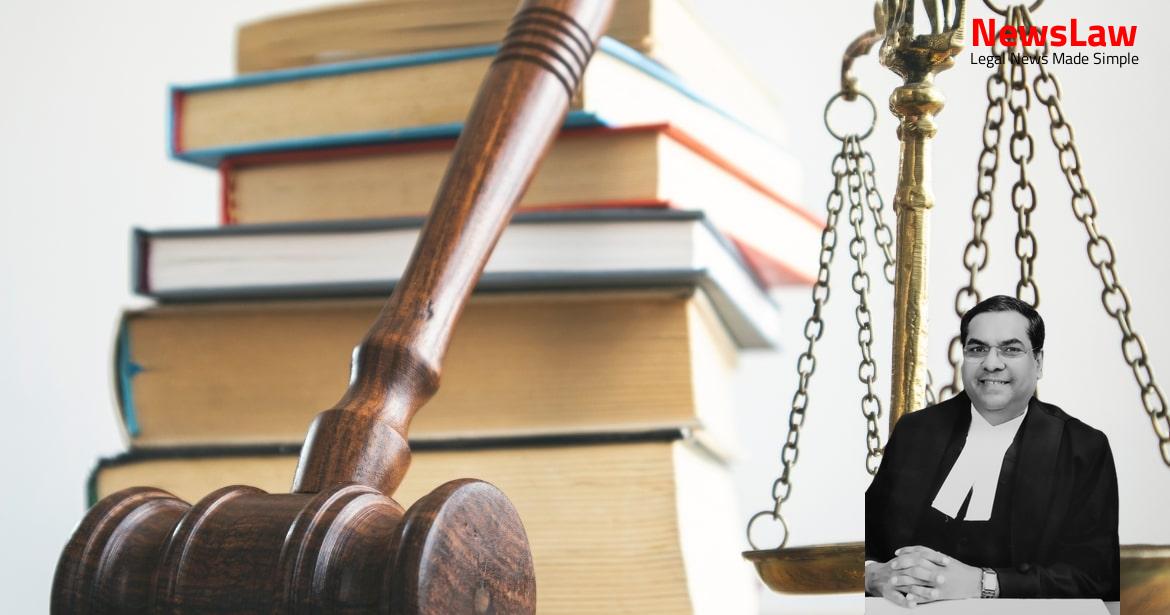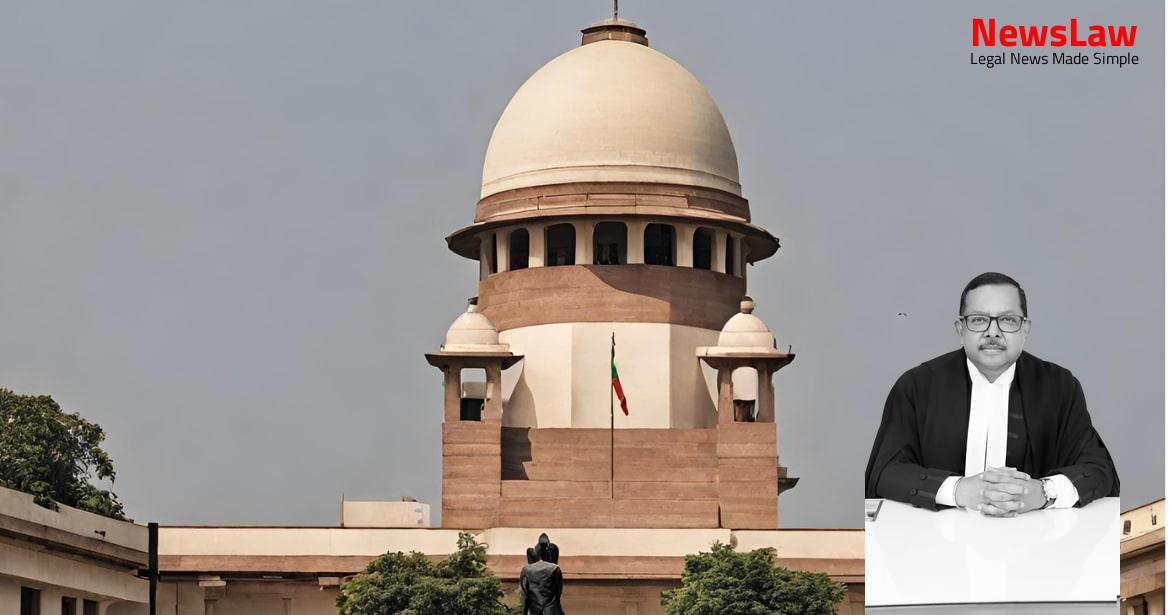Delve into the complex legal analysis conducted by the court regarding limitation laws in insolvency proceedings. The court’s thorough examination of the application of the Limitation Act in the context of corporate insolvency resolution process provides valuable insights into the legal framework governing such cases.
Facts
- The application under Section 7 of the Code was filed by respondent No 2 on 21.03.2018, seeking initiation of CIRP in relation to the corporate debtor.
- The corporate debtor defaulted in payment against loans and its account with Corporation Bank was classified as NPA on 08.07.2011.
- Various documents and notices were attached by the applicant to prove the existence of financial debt and the date of default.
- The respondent No 2 contended that the application is not barred by limitation as it was filed within the stipulated time.
- The Appellate Tribunal held that the application made in 2018 is within limitation as per the Code coming into force on 01.12.2016.
- The issue of limitation was specifically remanded to NCLAT for further consideration and it was determined that the application is not time-barred.
- The debt claimed by the financial creditor amounts to 1,011,573,308 rupees as of 28-02-2018, including additional interest and penal charges.
- The respondent No 1, the corporate debtor, challenged the application on various grounds including the maintainability and the validity of the claimed debt.
- Initiation of CIRP cannot be annulled due to the pendency of a petition under Section 19 of the Act of 1993.
- All pending matters cannot proceed during the moratorium period as per Section 14 of the Code.
- The right to apply under Section 7 of the I&B Code accrued to the respondent Financial Creditor on December 1, 2016.
- The appeal filed by the appellant was summarily dismissed by the Appellate Tribunal on September 17, 2018.
- The order of the Appellate Tribunal was not approved by the Court in the judgment dated February 26, 2019, in Civil Appeal No. 10710 of 2018.
- The issue of limitation was not decided by the Appellate Tribunal in the previous order dated September 17, 2018.
- The appellant approached the Court under Section 62 of the Code in Civil Appeal No. 10710 of 2018, which was considered and decided on February 26, 2019.
- In compliance with the Court’s order dated February 26, 2019, the Appellate Tribunal (NCLAT) re-evaluated the appeal and dismissed it in the order dated May 14, 2019, stating that the application is not barred by limitation.
Also Read: Legal Analysis in Joint Trials Error
Arguments
- The argument put forth by the petitioner is that the application made by respondent No. 2 is barred by limitation due to the date of default mentioned as 08.07.2011.
- The petitioner contends that Article 137 of the Limitation Act applies to the case, and since the right to sue accrued in 2011, the application filed in 2017 exceeds the three-year period limitation.
- The petitioner also emphasizes that the date of default, i.e., when the account became NPA in 2011, should be considered as the starting point for the limitation period according to the IBC.
- The petitioner refers to previous court decisions to support the argument that Article 137 of the Limitation Act, not Article 61 (b), should govern the limitation period for applications under Section 7 of the Code.
- Furthermore, the petitioner highlights that acknowledgment of debt in the balance sheet does not reset the limitation period under Article 137, as default occurs only once and cannot be considered as a continuing event.
- In the argument presented by the respondent’s counsel, heavy reliance was placed on Section 18 of the Limitation Act, which allows for an extension of the limitation period upon acknowledgment of liability by the party against whom a right is claimed.
- The respondent’s counsel emphasized that acknowledgments of debt made in the balance sheets, annual reports, and offer for OTS by the corporate debtor provide a fresh period of limitation from the date of each acknowledgment.
- The respondent’s argument is centered around the principle of ‘acknowledgment’ under Section 18 of the Limitation Act, asserting that the application in question is not barred by limitation.
- The appellant’s counsel, on the other hand, contended that the application is governed by Article 137 of the Limitation Act, with the three-year time period starting from the date of default, and that acknowledgments of debt do not provide a fresh period of limitation as default occurs only once.
- The respondent’s counsel also referred to proceedings before the NCLT, including meetings of the CoC and the moving of an application for liquidation of the corporate debtor, attempting to establish that the application is not barred by limitation.
- Arguments about the introduction of stringent limitation laws post the application, prejudice to other banks, and the proceedings undertaken post admission by NCLT were dismissed as having no substance.
- The NCLAT’s reasonings were upheld, stating that when the application is barred by limitation, all subsequent proceedings are non-est and can be annulled.
- The appellant’s counsel’s contention that there is no debt payable was countered by the inability to file an affidavit confirming non-receipt of any amount or that any received amount had been paid, ultimately leading to the dismissal of the appeal due to lack of merit.
Also Read: Dismissal of Contempt Petition: Legal Analysis
Analysis
- The Court emphasized the importance of the law of limitation in preventing disturbance of acquired rights or loss due to negligence.
- The Court clarified that the right to sue accrues when a default occurs, not based on the date of Code enforcement.
- Reference was made to the Innoventive Industries case to explain the trigger moment for CIRP by financial creditors.
- The Court disapproved the application of the Limitation Act to cases of mortgage liability in CIRP applications.
- The judgment highlighted the legislative policy shift from ‘inability to pay debts’ to ‘determination of default’ in insolvency proceedings.
- The impact of Section 238-A of the Code regarding the applicability of the Limitation Act was discussed.
- The Court rejected the arguments based on Section 18 of the Limitation Act for extending time for filing applications under the Code.
- The judgment reiterated that a debt being time-barred would render the remedy time-barred as well.
- Explanation was provided on when the right to apply under Section 7 of the Code accrues in relation to time limitation.
- The Court examined the reasoning of the Appellate Tribunal in light of the provisions of the Limitation Act, emphasizing the importance of the date of default in CIRP applications.
- The judgment discusses the objective of the Code to unify insolvency law and expedite the insolvency process.
- Key decisions from previous cases, like Innoventive Industries and B.K. Educational Services, were referenced and explained.
- The Court emphasized that the Code aims at reorganizing and resolving insolvency for corporate debtors, not merely money recovery.
- Various aspects related to the initiation of Corporate Insolvency Resolution Process (CIRP) were analyzed, including the trigger for CIRP by a financial creditor and the definition of default under the Code.
- The application of limitation laws, particularly Article 137 of the Limitation Act, to applications under Section 7 of the Code was clarified.
- The Appellate Tribunal’s application of limitation rules, especially the use of the Limitation Act’s provisions for suits, was highlighted and eventually challenged.
- The case was remanded back to the Appellate Tribunal for a proper decision on the limitation issue, in line with the law and previous judgments.
- Section 7 of the Code allows a financial creditor to initiate corporate insolvency resolution process against a corporate debtor when a default has occurred.
- The term ‘claim’ is defined under the Code to include various rights to payment or remedies for breach of contract.
- Section 238-A of the Code deals with limitations and requirements for financial creditors to make an application for insolvency resolution.
- Part II of the Code applies to insolvency and liquidation of corporate debtors where the default amount is at least one lakh rupees.
- The Adjudicating Authority must give notice to the applicant to rectify any defects in the application before rejecting it.
- The corporate insolvency resolution process starts from the date of admission of the application by the Adjudicating Authority.
- The financial creditor must provide evidence of default and propose a resolution professional along with the application.
- Section 18 of the Limitation Act pertains to the effect of acknowledgment in writing on the period of limitation for a suit or application.
- Admission under Section 7 of the Code by NCLT resulted in a moratorium under Section 14
- 69 petitions under Section 19 of the Act of 1993 could not proceed during the moratorium period
- NCLT did not consider the question of limitation, NCLAT decided on irrelevant grounds, and attempts to save limitation through acknowledgment principles failed
- Impugned orders should be set aside, and the application rejected as time-barred
- Moratorium will be lifted, allowing stalled proceedings to resume in accordance with the law
- Observations in the judgment pertain only to the limitation issue in the Section 7 application
- This judgment does not affect other proceedings, which will be dealt with on their merits and as per the law
Also Read: Legal Analysis on Goods Confiscation and Penalties
Decision
- The parties are directed to the National Company Law Appellate Tribunal for fresh consideration of the objection raised by the appellant regarding the claim being barred by limitation
- The impugned orders dated 14.05.2019 and 09.08.2018 by the National Company Law Appellate Tribunal and National Company Law Tribunal are set aside
- The application under Section 7 of the Code is rejected for being barred by limitation
- All proceedings related to the application under Section 7, including the appointment of IRP, stand annulled
- The application made by respondent No 2 under Section 7 seeking initiation of Corporate Insolvency Resolution Process for respondent No 1 is rejected for being time-barred
Case Title: BABULAL VARDHARJI GURJAR Vs. VEER GURJAR ALUMINIUM INDUSTRIES PVT LTD (2020 INSC 490)
Case Number: C.A. No.-006347 / 2019



